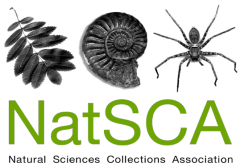Project Manager (within the Angela Marmont Centre for UK Biodiversity)
The Angela Marmont Centre for UK Biodiversity (AMC) at the Natural History Museum, London is unique within the UK. In addition to acting as a centre to promote the appreciation and study of UK biodiversity, it aims to address two of the central problems facing biodiversity and taxonomy; namely how to inspire and nurture existing and future naturalists, and how to engage the wider public in natural history science. The AMC's goal is to become a national centre to promote the understanding of UK biodiversity and geodiversity. It acts as a hub for collaborations between amateur and professional scientists and serves as a first point of contact where interested members of the public can deepen their interests, find like- minded people and join exciting projects that help them develop and learn more about natural history and science.
The AMC team provide access to UK reference collections, manage the Museum's Identification and Advisory Service, host identification training courses, play an active role in public engagement activities and run an innovative citizen science programme of participative research projects that are open to anyone.
The AMC team is looking for an experienced natural history professional to project manage their Identification Trainers for the Future project. Funded by the Heritage Lottery Fund Skills for the Future Programme (http://www.hlf.org.uk/HowToApply/programmes/Pages/SkillsfortheFuture.aspx), the project aims to proactively tackle the ongoing loss of taxonomic expertise within the UK’s natural heritage sector, particularly wildlife identification and recording skills. It aims to support early career naturalists through the provision of 15 high quality 12-month work-based training opportunities at the Natural History Museum (with placements at the Field Studies Council). As well as producing a series of highly skilled professionals, the project will output a wide range of identification-based training materials and potentially a new identification qualification for use across the UK.
Reporting to the Head of Centre and working as part of a small multi-organisation team, the post holder will be responsible for leading the day to day management and delivery of the project throughout its 6- month development phase and 3-year active phase. Core responsibilities will include coordinating and guiding the development of training content and work-based placements and recruiting and line managing the trainees (five per year for three years). The successful candidate would be responsible for compiling regular written progress reports and communicating experiences and lessons learnt within the natural heritage and wider academic sectors.
The postholder will form an integral part of the AMC team and where time permits will be able to participate in a range of wildlife identification-based science engagement activities, which collectively aim to introduce diverse public audiences to the value of identifying and recording nature and exploring the UK’s fantastic natural heritage.
The post is funded by the Heritage Lottery Fund and will be based within the Natural History Museum, London. Partners within the project include the Field Studies Council and National Biodiversity Network Trust
Salary: £27,888 per annum per annum plus benefits, additional funding maybe available for an exceptional candidate
Contract: 3.5 years Fixed-Term Appointment
Closing Date: Midnight on Sunday 13th July 2014
Role competences:
1. Degree in biological science or equivalent experience
2. Postgraduate qualification in a biological science (or related subject) or equivalent experience
3. Proven experience as a professional or academic natural scientist
4. Demonstrable practical experience of project managing multi-partner projects
5. Practical experience and sound understanding of taxonomy and systematics
6. Familiarity with the breadth of UK wildlife and a deep understanding of the UK biodiversity sector, including the contributions made by professional organisations and voluntary natural history societies and recording schemes, and the relationships between these groups
7. Experience of managing and/or formally training staff or volunteers
8. Ability to negotiate and influence with tact, diplomacy and sensitivity and to build good working relationships with a broad range of stakeholders (e.g. amateur and professional scientists, government agencies)
9. Evidence of communicating science effectively (both written and verbal) and with confidence to non-expert audiences
10. Confident team worker, but with ability to work on own initiative
Online application process:
Completing the online application form.
You are required to address each criterion from the competences (requirements) section of the role specification (section 3).
Please provide specific examples from your achievements, knowledge, skills or experience to demonstrate how you meet each of these competences for the role.
Please use one field per competence and using no more than 140 words per field, provide us with the information of how you meet this competence.
